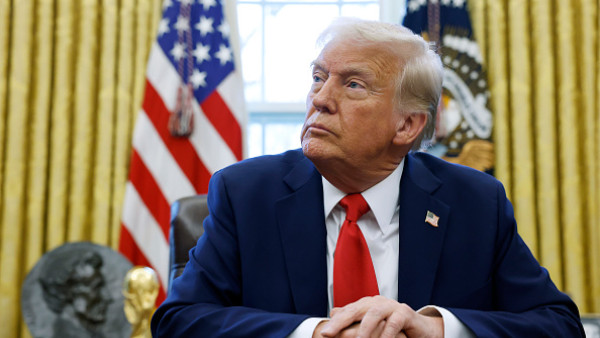Trump’s decree is considered to be a renewed attempt to impose a travel ban similar to that introduced during its first mandate, which initially targeted citizens of the Muslim majority (Getty)
The Trump administration began to cancel visas retroactively in the context of preparations to restore a controversial travel ban targeting people in several Muslim majority Muslim, said US sources The new ArabicArabic edition, Al-Arabby al-Jadeed.
American embassies in several countries have informed some visa holders – including those already in the United States – that their visas have been dismissed. These people were invited to report to their respective American embassies for new interviews.
This decision would be linked to the next travel ban by Donald Trump, who is expected to target citizens in several Muslim majority countries next week.
The decision follows an executive decree issued by Trump on January 20 entitled “Protect the United States against foreign terrorists and other national security threats”.
The order describes the new security procedures for Visa candidates and imposes an examination of the people who entered the United States during the administration of President Joe Biden.
Libyan students among people affected
Several Libyan students who recently obtained American study visas were informed by e-mail that their visas had been canceled. They were invited to visit the United States Embassy in Tunisia – since the United States has no embassy in Libya – for other interviews, Al-Arabby al-Jadeed reported, citing a source of human rights.
The source added that the cancellations of retroactive visa applied not only to those who are still outside the United States, but also to Libyan students already in the country, effectively canceling their status of residence.
Libya has now been confirmed as one of the countries included in the next travel ban.
Trump’s decree is considered a renewed attempt to impose a travel ban similar to that introduced during its first mandate, which initially targeted citizens of Libya, Iran, Sudan, Syria, Yemen and Somalia, as well as North Korea, Cuba and Venezuela.
The new order orders the American authorities to review the individuals of these countries that have entered the United States since the inauguration of Joe Biden on January 20, 2021. If the authorities find security problems or questionable activities, these people could face the expulsion.
The order also provides for a return to the strict verification procedures previously applied during the first term of Trump, which Biden revoked later. Trump’s policy has notably blocked individuals from the Muslim majority in the pretext of security problems.
The executive decree specifically calls for the examination of the visa holders of the countries with what Trump claims to be “lax security screening process”.
He insisted that the United States must ensure that “foreign nationals admitted to the United States did not give up hostile attitudes to its citizens, culture, government, institutions or founding principles”.
Impact on Afghan and Pakistani nationals
The new ban should introduce three distinct categories:
- The “Red List” – This should include all countries previously subject to the 2017 ban, as well as Afghanistan and perhaps Pakistan.
- The “list of oranges” – the citizens of these countries will face more strict visa demand processes. Richness can benefit from a visa for commercial purposes, but immigration and tourist visas will be strongly limited.
- The “yellow list”-The countries of this list will be given 60 days to improve security measures and information sharing protocols with non-compliance with the United States could cause partial or complete travel restrictions.
The reports indicate that around 200,000 Afghan citizens who previously received the approval of the United States for refugee or special immigrant visas (SIV) are now confronted with uncertainty. Many of these people worked alongside American forces during the war in Afghanistan.
In response, groups such as the American-Islamic Relations Council (CAIR) have urged Afghan visa holders currently outside the United States to return immediately before the implementation of the prohibition.
Cair condemned the administration’s decision, warning that the reintroduction of a ban on Muslim travel would unjustly target people who have already passed rigorous security screening procedures.
Trump has already undertaken to extend the ban on travel during his campaign, promising to introduce ideological screening to prevent what he described as “hateful, extremists and madmen” from entering the country.
Critics have largely condemned this decision as discriminatory and a barely veiled attempt to target the countries with Muslim majority under the guise of national security.


